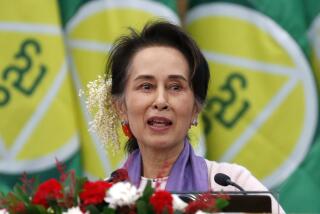Cambodia’s Open Wound
- Share via
The Khmer Rouge fanatics who presided over the deaths of as many as 2 million Cambodians remain free in their land nearly 24 years after their government was toppled. None have been brought to trial. Villagers walk past onetime killing fields each day and the country tries to move forward, but the refusal to impose justice festers.
Last week, the United Nations resumed talks with Cambodia about possible trials. The U.N. needs to remain firm and not let the current ruler, Prime Minister Hun Sen, tailor a trial of his liking, one in which he makes his enemies scapegoats and shields himself and his friends from scrutiny.
The U.N. properly cut off earlier talks with the Cambodians over Hun Sen’s refusal to establish a court that meets international standards of justice. One example of how to conduct such a trial can be seen in Sierra Leone, where local and international judges and prosecutors are conducting war crimes trials stemming from the decade-long civil conflict in the West African nation. By contrast, Hun Sen’s government two years ago passed a law requiring any such court to be dominated by Cambodian judges, with no requirement for an independent prosecutor.
France and Japan led the push to resume negotiations, and the U.N. General Assembly agreed last month on a 154-0 vote, with the United States voting with the majority and most European Union nations abstaining on the grounds the resolution did not set forth stringent enough standards to ensure a fair and independent trial.
The Khmer Rouge ruled Cambodia from 1975 to 1979. Its decrees devastated the population through executions and by causing starvation and disease, yet its rulers have escaped punishment. One was granted amnesty; the leader, Pol Pot, died; others live freely in the country. Tuol Sleng, the schoolhouse made into a jail where at least 14,000 were killed, became a Phnom Penh destination for tourists with strong stomachs.
Hun Sen was a Khmer Rouge commander who fled when Pol Pot turned against him. Backed by Vietnam, he returned to take control after the Khmer Rouge defeat and has refused to yield power since, even after losing elections. His courts are not strong enough or sufficiently free from corruption to hold a legitimate trial on their own.
The U.N. must be careful not to be a pawn in a sham legal proceeding that tarnishes its reputation and does nothing for Cambodians. Only a fair and credible trial will let Cambodians understand their past and demonstrate that individuals and governments can be held accountable.
More to Read
Sign up for Essential California
The most important California stories and recommendations in your inbox every morning.
You may occasionally receive promotional content from the Los Angeles Times.













